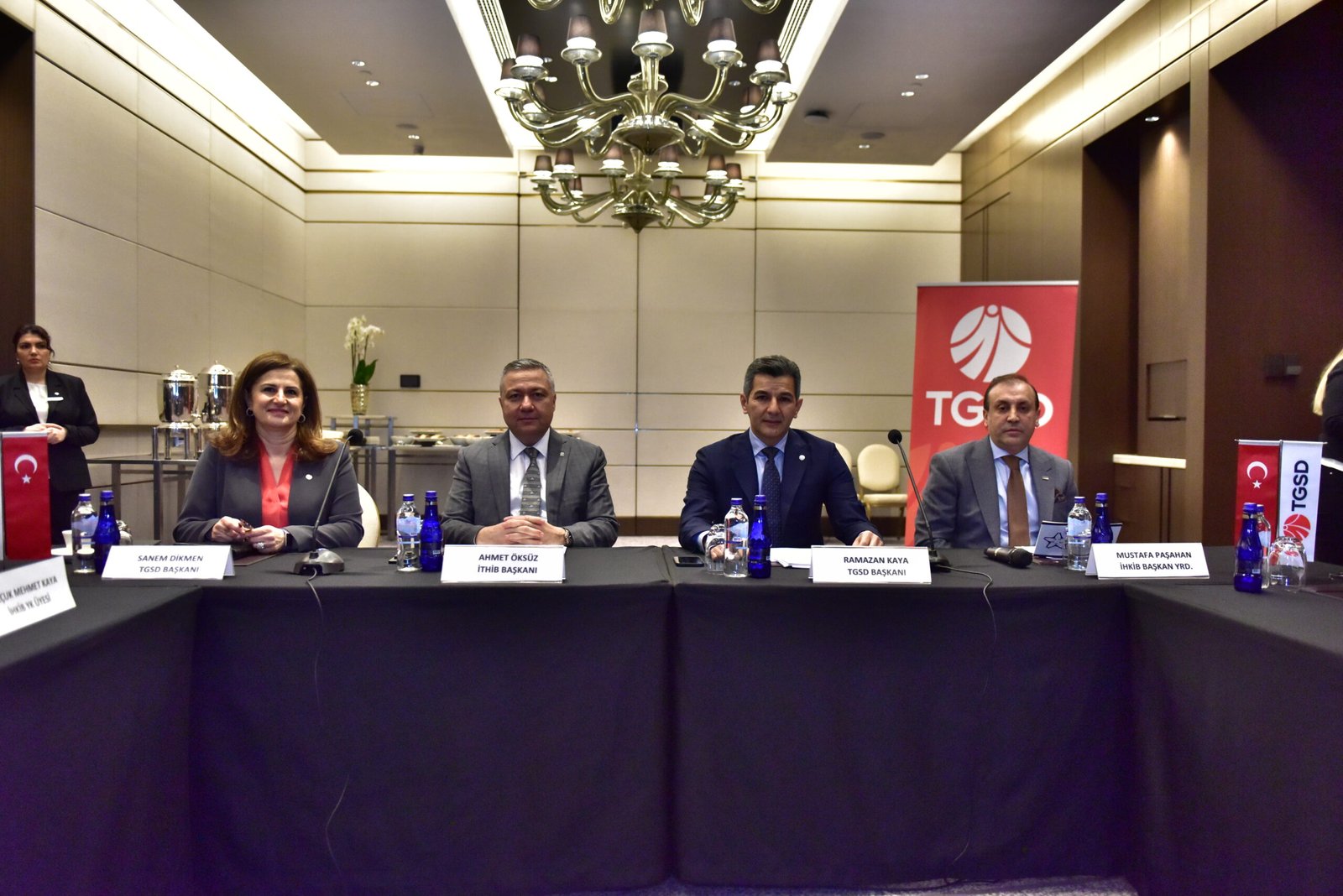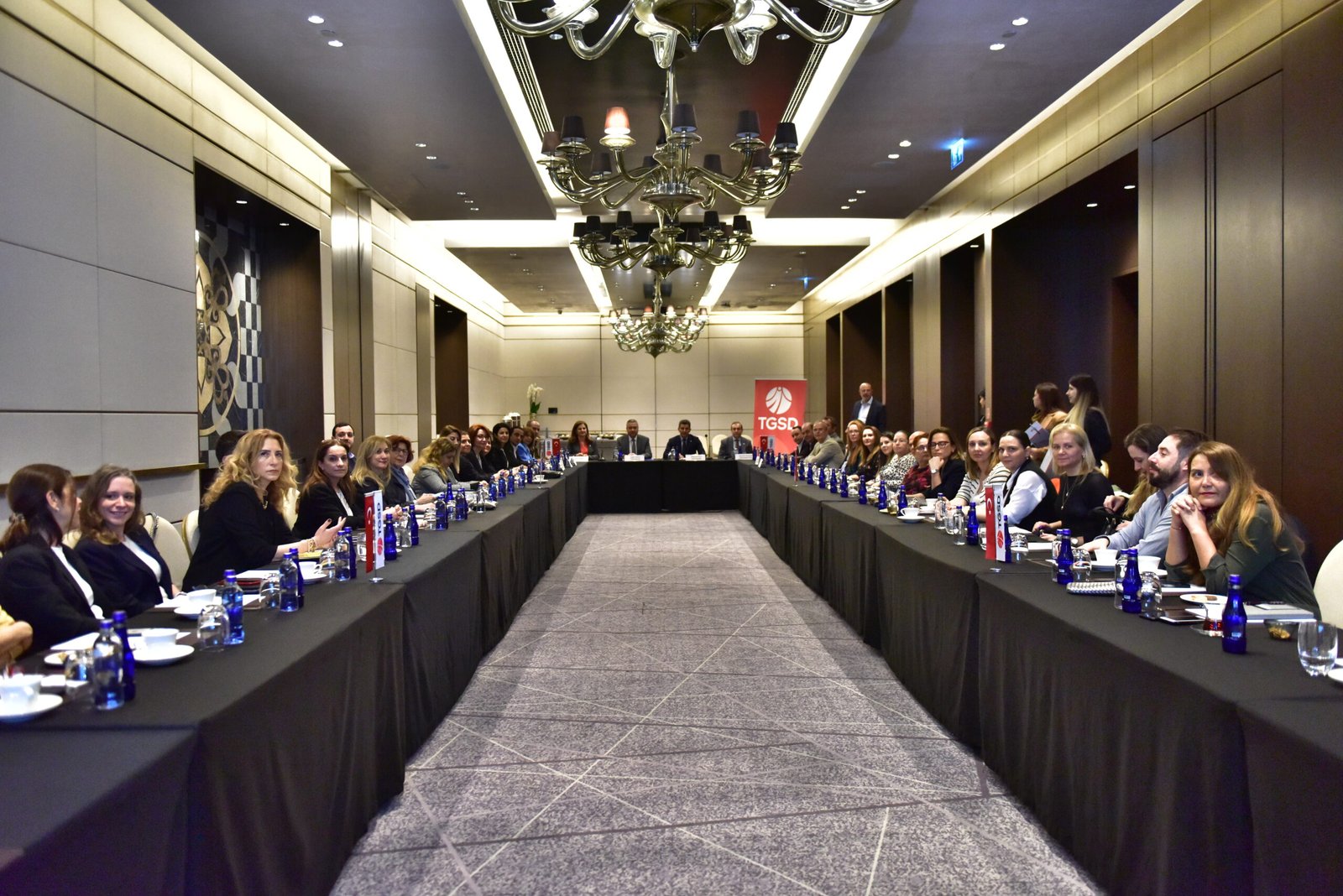
Representatives of the garment ındustry and textile sectors met with purchasing offices of international brands for the second time to evaluate post-earthquake developments.
Global brands making $10 billion purchases Türkiye ile ‘iş birliğine devam’ mesajı verdi
In the second meeting hosted by TGSD with purchasing office representatives of international brands within a month, it was emphasized that there were no obstacles to Turkey meeting orders and signing new collaborations. Purchasing office representatives focused more on high costs and production standards.
The heads of the garment ındustry and textile sectors met with representatives of international purchasing offices in Istanbul to evaluate the developments following the earthquake.
At the meeting, attended by representatives from 25 purchasing offices including Inditex, H&M, Tommy Hilfiger, Calvin Klein, Superdry, Spring Near East Manufacturing, Tesco, Ralph Lauren, Tom Tailor, Varner and Puma, the message given was that ‘we must focus on sustainability in medium and long-term collaborations as well as in production’.
Istanbul Textile and Raw Materials Exporters' Association (ITHIB) President Ahmet Öksüz and Istanbul Ready-to-Wear and Apparel Exporters' Association (IHKIB) Vice President Mustafa Paşahan also attended the meeting hosted by the Turkish Clothing Manufacturers' Association (TGSD).
WE SHOULD TAKE INITIATIVES TO IMPLEMENT ‘PREVENTIVE IMPORT’ WITH THE US
TGSD President Ramazan Kaya said that the garment ındustry and textile sectors have the capacity to meet orders under current conditions. Kaya emphasized that he does not see any obstacles to the continuity of long-standing collaborations with international brands. Kaya reported that while the first meeting held a month ago with representatives of purchasing offices mostly discussed earthquakes and aid, costs and production standards came to the agenda in the second meeting, and continued as follows:
“We can see the questions and suggestions directed to us at the meeting as a sign of a return to normal. Brands that purchase 10 billion dollars worth of garment ındustry from Turkey annually want to continue with us after the earthquake. However, our competitiveness is weakening because we have difficulty in keeping prices due to high costs. We should be able to attract our customers to the earthquake zone with people-oriented projects such as shelter and social support. We need a sectoral and industrial transformation in order to turn Anatolia into a production base. We need to restructure the sector and organize accordingly. We should make a social revolution that will encourage reverse migration. We should work the strong muscles of the Turkish apparel ındustry sector such as flexibility, speed, capacity and quality more. On the other hand, the US started the ‘preferential import’ application with Pakistan after the flood disaster last year. We should also take initiatives with the US for a similar application for at least two years.”
SANEM DİKMEN: WE WANT MEDIUM AND LONG-TERM BUSINESS CONTINUITY, NOT A GRANT
TGSD President Sanem Dikmen reported that two issues came to the fore in the meeting where they assessed the situation after the earthquake. Dikmen said the following:
“In the first heading, we talked about what can be done to recover the textile and ready-to-wear sectors, to reach the volume before the earthquake and to restructure the system where everyone can be happy. Secondly, we focused on continuity in cooperation with our customers. Our sectors have done very important work on sustainability in production in recent years. We expect support from our customers for our cooperation to be sustainable in the medium and long term, not grants. Our sectors have also experienced crises in the past. We left them all behind in a short time with our rapid adaptation ability. I believe that we will overcome this period as soon as possible with the support of our business partners.”
AHMET ÖKSÜZ: IT IS VERY IMPORTANT THAT INCENTIVES BE DETERMINED ON A DISTRICT BASIS AND CHANNELLED TO THE RIGHT PLACE.
İTHİB President Ahmet Öksüz emphasized that textile and garment ındustry are two very important sectors for the earthquake zone. Öksüz stated that the region will get back on its feet with these two sectors and continued his words as follows:
“After the earthquake, our textile and apparel industry sectors showed great solidarity. We expect the same solidarity and support from our business partners. We will recover production together. We also have expectations from our state. It is very important that incentives are determined on a district basis and channeled to the right place. Unfair competition should not be allowed. Currently, the production wheels have returned to the old level by 50 percent. However, our greatest need for us to return to the old level completely is to protect the employment in the earthquake zones. In this context, in order for the reverse migration movement to begin, the urgent sheltering needs of our employees employed in the region must be met and they must be supported with additional incentives,” he said.
MUSTAFA PAŞAHAN: THE STATE CAN PROVIDE ADDITIONAL SUPPORT TO EMPLOYEES' SALARIES
IHKIB Vice President Mustafa Paşahan also said in his speech that production in the earthquake zone will return to normal within a few months. Reminding that the state announced some support to support production in the region, Paşahan continued as follows:
“As IHKIB, we also had additional demands and suggestions that we conveyed to Ankara verbally or in writing. These demands and suggestions are as follows:
- Including the entire earthquake region within the scope of the attraction centers program;
- Providing additional state support for salaries of workers in the region;
- Providing additional employment support to existing investments of businesses headquartered or producing in the region;
- Adding digital and green transformation investments as the fifth component of the investment incentive package;
- Developing temporary and permanent shelter solutions, especially in areas close to industrial zones.
We hope to receive a positive response to our requests and suggestions as soon as possible.”
